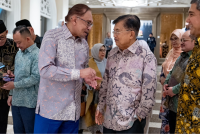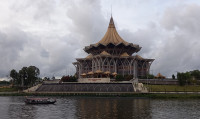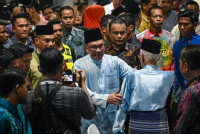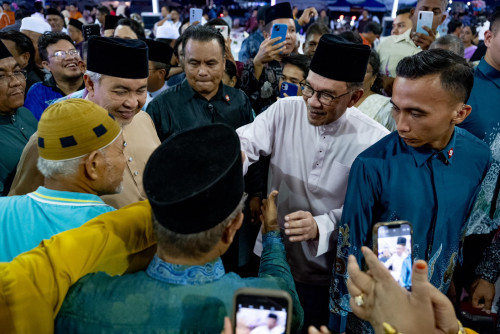IN a country of religious people, religious interpretation is a double-edged sword. It can be a spiritual force to eradicate injustice, but is often misused to legitimise it.
The same goes for religious interpretations related to child marriage in Indonesia. Mainstream Muslims permit it. The Indonesian Women Ulama Congress says there is an obligation to protect children from dangerous marriages.
It is a growing problem.
The numbers of underage girls entering into marriages in Indonesia has skyrocketed. The National Socio-Economic Survey in 2020 showed that 8.19% of Indonesian women married for the first time between the ages of 7-15.
The legal age for marriage in Indonesia is 21. Girls can marry if a religious court grants a dispensation. In 2020, when Covid-19 hit, the number of marriage dispensations allowed by religious authorities almost trebled overnight.
From 2016 to 2019, 60,679 marriage dispensations were granted, Religious Court of Indonesia data showed. Over the next three years, that ballooned to 175,504. In 2020 alone, there were 63,382 – more than the previous four years combined. The numbers eased in 2022 but are still very high.
Despite these figures, the regulation of the marriage age in Indonesia is actually quite good. The law of 1974 on marriage stipulates that the ideal age for marriage is 21 for both men and women. Males aged 19 could marry with parental permission. For girls, that age was 16. A legal change in 2019 revised it so both males and females could not be married under 19 unless they received a dispensation from the Religious Court.
Unfortunately, society has not caught up with the law.
Women are still viewed as sexual objects and men’s reproductive machines. This view of women has led to the belief that women are a source of temptation that threaten men’s faith. Child marriage is believed to be a way to control children’s sexuality, as well as to prevent and overcome pregnancies outside of marriage, which are forbidden in Islam.
The impact of sex and marriage on girls
Islam strongly prohibits sex outside of marriage. Marriage is the beginning of legal sexual relations and reproductive roles. The difference in male and female reproductive systems has significant impacts.
For men, reproduction is a brief and pleasurable release. Women, however, experience menstruation for weeks, pregnancy for months, childbirth for hours or days, postpartum bleeding for weeks or months and breastfeeding for years. All of these come with painful impacts, especially for adult women, let alone underage girls.
The social impacts are extreme. Married girls, especially those who become pregnant, lose their playing time as a child, drop out of school, have low bargaining power in the job market and are vulnerable to becoming victims of trafficking. Male children can continue to play, continue their education, their bargaining power in the job market remains unchanged and they are not vulnerable to becoming victims of trafficking.
Married girls are vulnerable to five forms of gender injustice at once: stigmatisation because they are seen as a source of temptation; marginalisation in the form of forced marriage and prohibition from continuing education when pregnant, especially due to adultery; subordination because they are seen only as sexual objects for men; violence in the form of domestic abuse or trafficking; and the added burden of divorce or being abandoned.
Why Islam allows child marriage
The mindset that women are a source of temptation greatly influences Islamic thinking. Fatwas (a ruling on a point of Islamic law given by a recognised authority) produced from this kind of mindset follow a pattern. Actions by or involving women are measured by their correlation to their potential to cause temptation. If an action is seen as certain to cause temptation for men, it is considered haram (forbidden). If there is a possibility of causing temptation, then it is considered makruh (disliked). If it is certain that the action will not cause temptation, then it is allowed.
Child marriage is believed to prevent temptation for men caused by women, so it is allowed.
Female ulamas in Indonesia believe that Islam’s perspective on women sees them as complete human beings and full rulers. Both men and women are intellectual and spiritual beings and the ability to reason is a characteristic that distinguishes all humans from other creatures. They are both full rulers in the system of life because they are both khalifah (ruler) on earth, and thus responsible for realising and enjoying goodness, as well as preventing and protecting against evil. Neither men nor women should be regarded as secondary subjects or objects in the system of life.
As complete human beings and full subjects, men are not the sole standard of humanity and justice for women. This means women’s unique bodily and social experiences are valid sources of knowledge. These two types of women’s experiences must be taken into consideration when formulating justice, whether in the form of state policies, social wisdom, or religious welfare.
Women’s substantive justice, originally called “Hakiki Justice” is justice that integrates women’s unique human experiences. It emphasises that an action is considered fair only if it does not exacerbate women’s unique bodily experiences or perpetrate any form of gender-based injustice against women. Since men do not experience these things, it is highly likely that they do not understand the pain of these unique bodily and social experiences. Due to this lack of understanding, these experiences are often ignored.
Meanwhile, decision-making, whether in marriage, family, society and the state, in terms of politics, economy, culture, and religion, are still dominated by men.
A new knowledge system
The knowledge system that integrates true women’s Hakiki justice sees men and women as complete human beings and full subjects in the system of life. This new mindset sends different patterns of fatwas. If an action is necessary to realise good or to prevent harm to men and/or women, then it is a must. If an action is possibly needed for this purpose, then it is recommended. If an action cannot be allowed for this purpose, then it is forbidden.
The goodness of marriage in Islam is for both men and women. If a marriage has a negative impact on both parties, or only one of them, then it must be prevented. Even if the negative physical and social effects of child marriage only impact women due to their reproductive system, such a marriage must still be prevented.
Protecting children from harmful marriages is therefore mandatory.
The repositioning of men and women in the new knowledge system will give differences in interpreting mainstream religious texts on many other women’s issues. However, if the goal of the law is welfare for humankind, then the primary validity of an interpretation is certainly on its ability to materialise the welfare of both men and women. – The Vibes, April 12, 2023
Nur Rofiah is a lecturer in The Institute for Quranic Science in Jakarta, Indonesia. She is also a national board member of LKK-NU, a sub-organisation of the largest Indonesian Muslim organisation called Nahdlatul Ulama. Rofiah is also a researcher and a facilitator on Islam and gender issues who has done some research on marriage and family issues that she shares with thousands of participants in her monthly webinar.
Published under Creative Commons and in partnership with 360info.org








_with_his_US_counterpart_Joe_Biden._Source_-_US_Embassy__Consulates_in_Indonesia.png)












